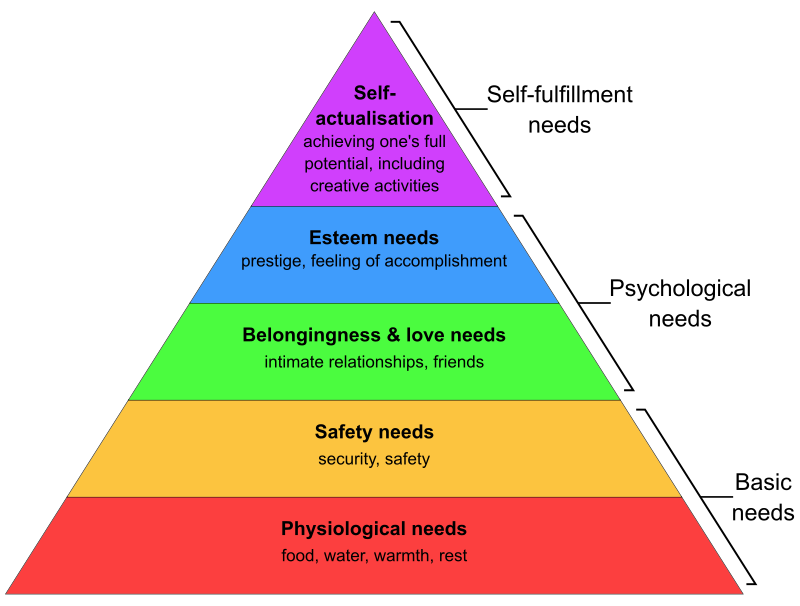In 1943, the American psychologist Abraham Maslow introduced his renowned “hierarchy of needs“, a model which, while historical, remains deeply pertinent in understanding modern societal structures and individual motivations. Maslow posited that higher human needs like self-esteem and love can only be attained once foundational needs such as food, air, water, and security are met. In a world increasingly rocked by global crises and rapid technological advancements, Maslow’s structured ranking of these needs into five categories offers a lens through which we can decipher our evolving priorities:
- Physiological Needs: e.g., food, water, air, rest.
- Safety Needs: e.g., security, health, financial stability.
- Love and Belonging: e.g., friendships, family, intimacy.
- Esteem: e.g., respect, self-esteem, recognition.
- Self-Actualization: realizing personal potential, creativity.

Introduced amidst World War II, the hierarchy demonstrated its relevance in the post-war context, as societies were trying to come back to a form of normality.
In the ensuing decades, significant advancements in living standards rendered Maslow’s hierarchy somewhat less prominent. Particularly, the highest level —concerning self-actualization— has been the focal point for psychologists and well-being experts, emphasizing individual purpose and potential. However, recent global disruptions within our efficient hyper-globalized, albeit fragile, world, prompt us to revisit this hierarchy in its entirety.
The foundation, ‘physiological needs’, underscores basic sustenance. Recent events, such as the COVID pandemic and potential implications of the Russo-Ukrainian conflict, have underscored the fragility of our once-reliable supply chains – remember the empty pasta shelves in supermarkets? We have been reminded that a constant supply of “everything, everywhere, anytime” is a historical anomaly and that we may have to reconsider that assumption in the future.
‘Safety and security needs’ form the pyramid’s second tier. The global reaction to COVID have fostered perceptions —whether valid or not, that’s a discussion for another time — that our governments might be ill-equipped against unforeseen health crises. Contemporary issues like uncontrollable price inflation (related to financial security), border security concerns (physical security), and personal data breaches resulting from cyberattacks have only exacerbated these sentiments.
Historically, during crises, many looked to the USA for stability. Yet, as Peter Zeihan detailed in “The End of the World is Just the Beginning” (not a very happy title, I must admit), the U.S. appears more inward-focused. Fitch’s recent downgrading of U.S. government debt and the tumultuous situation in Afghanistan further erode the ideal of an unyielding Pax Americana.
And yet, Maslow asserted that when large populations cannot meet basic needs, it hinders their ability to satisfy psychological ones. Anecdotally, societal anxiety, dwindling social connections and fluctuating fertility (with harmful demographic and ultimately economic consequences) seem to substantiate this. The omnipresent virtuality of the COVID era, while erasing borders, paradoxically distances us from immediate community, catalyzing a potential shift toward a dehumanized civilization.
On the other side, institutions that historically provided balance – “the church, the Republic, the military” as the saying goes in France – are waning in influence. This decline, accompanied by growing governmental distrust, accentuates the hurdles contemporary governance faces.
To adapt, both individuals and corporations are devising novel stability strategies. Evident changes in electoral behaviors, including in Italy earlier this year, reflect a populace desiring enhanced protection. Observably, societal fractures are deepening and emergent financial mediums like cryptocurrencies (as expressed by Ethan Zuckerman in his book Mistrust: Why Losing Faith in Institutions Provides the Tools to Transform Them) question established fiscal paradigms.
Given this backdrop, it is now crucial to re-evaluate our collective behaviors. While I neither strictly champion de-growth nor consider myself an ‘ESG guru’, it seems we are moving beyond unchecked consumption. Both corporations and consumers should prioritize sustainable, value-based consumption and efficient resource allocation. Regionalizing supply chains, even with economic concessions, might bolster local resilience and counteract pandemic-induced societal rifts.
Additionally, in our rapidly changing, information-saturated world, every individual must construct their ‘safety net’ — relying on trusted entities for physical, psychological, and intellectual support. Such a network can mitigate reactionary fears and their potential harmful ramifications.
My aim in writing this article is in no way to sound defeatist. I believe that our companies have within them the resources to face the challenges that lie ahead. However, I do believe that we need to start adapting our “software” to the new global situation. Governments, companies, and individuals need to work together to build robust foundations that will help us navigate the potentially turbulent years ahead. By revisiting and understanding Maslow’s pyramid, we can ensure that our approach to these challenges is both holistic and grounded in fundamental human needs. It is high time we pay closer attention to these foundational principles, ensuring that every step we take is aligned with the well-being and progression of humanity as a whole.
